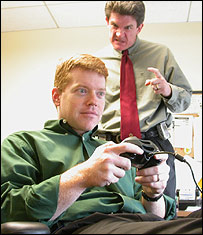
NEW YORK (CNN/Money) – Rejoice, my fellow corporate drones, you need no longer hide behind your monitor at work as you sneak in a game of solitaire!
Gone is the shame of swapping links to time-sucking Web games. And banished is the fear of the managerial stink-eye as you use the company intranet for a "Quake" server.
On the off chance a co-worker or employer mentions that work hours might not be the most appropriate time to indulge in such recreational activities, laugh heartily and tell them you're not playing a game - you're improving your productivity.
 |
|
| Managing Editor Allen Wastler doesn't have as much faith in Goldstein's findings as I do. |
If they persist, refer them to Dr. Jeffrey Goldstein at the University of Utrecht. He became a personal hero of mine earlier this month when he revealed the findings from his study on the effects of game playing at the workplace. In short, an hour or so of gaming per day improved both productivity and job satisfaction.
Now, in all fairness, that study was at a single company: A Dutch insurance firm. And Goldstein, hoping to avoid a media frenzy isn't saying anything beyond what was said at the conference where he revealed those preliminary findings.
"Our study is a pilot or feasibility study which it would be premature to publicize at this stage," he said when asked for further comment on the story. "Once we are able to replicate the study on a larger scale, for a longer period, with better controls, then we will be in a position to discuss its possible implications publicly."
| HARD AT WORK?
|

|
| Looking to boost your own productivity? Try these sites!
|
|
|
|
Ok, I'll give him credit for wanting to ensure his findings weren't a fluke. Goldstein's not a newcomer to the world of psychology, after all. He was a professor at Temple University for nearly 20 years, has been at Utrecht in the Netherlands since 1992 and has written and edited several books on the effects games have on people.
From a layman's point of view, though, this makes perfect sense. In fact, you could easily tie it back to a popular cliché: All work and no play makes Jack a dull boy.
Goldstein found that putting work aside occasionally for a little playtime breaks up the day and gives your brain an escape from complex work tasks. Essentially, games are the same as a coffee break, but this sort of break keeps your cortex stimulated.
Increased job satisfaction? It doesn't take a Ph.D. to figure out the logic behind that. Given the choice of poring over another Excel spreadsheet or playing Spank the Monkey, which would you choose?
At the heart of this is the illusion of control. Whether it's the annual Elf Bowling program or that blasted helicopter game that Dave Barry made a worldwide sensation, games make the corporate rounds faster than most rumors. They're addictive – and they let employees feel like they're recapturing control of at least a small part of their day.
We're certainly doing our part here at CNN/Money. Pretty much every Friday, the Fun Site of the Day on our EyeOpener newsletter links to an addictive Web game. These, however, are a little outside of Goldstein's parameters. His test subjects stuck with simple Windows games, like Solitaire and Minesweeper.
| NOT THROUGH PLAYING?
|

|
|
|
|
It will be interesting to see if Goldstein's larger study reflects the same results, as well as whether the types of games played dramatically affect productivity.
In the meantime, I'll be firing up the Xbox I just installed in my office. Gotta stay productive, ya know.

Morris is Director of Content Development for CNN/Money. Click here to send him an e-mail - or, even better, a link to a really cool Web game
|

